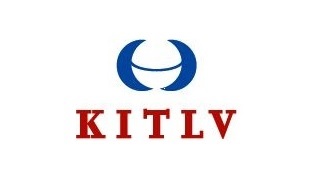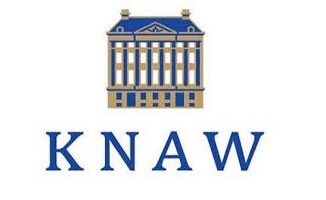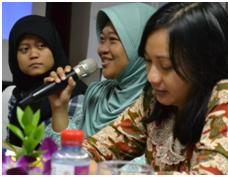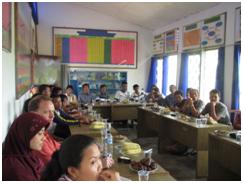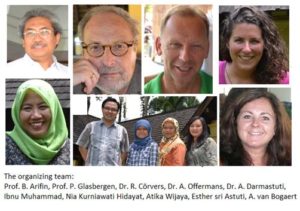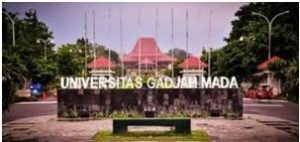Conference ‘How Indonesia works: Governance, Democracy and Citizenship’
12 & 13 December 2016 | Universitas Gadjah Mada | Yogyakarta | Indonesia
Final conference of the Indonesia- Netherlands collaborative research program on ‘Governance, Markets, and Citizens’.
Hosts are the KITLV/Royal Netherlands Institute of Southeast Asian and the Caribbean Studies in Leiden and the Universitas Gadjah Mada (UGM) Yogyakarta.
Sponsors are the Royal Netherlands Academy of Arts and Sciences (KNAW) and the Directorate-General for Higher Education of the Indonesian Ministry of Research, Technology and Higher Education (MinRISTEK/DIKTI).
Invitation
How does Indonesia work? How are the most important decisions made and implemented that affect its 256 million citizens? The answer is far more complex than simply ‘by the government.’ ‘Governance’ concerns the negotiated process of making decisions in which many collective actors participate. National and international government agencies, non-government organizations, informal social movements, business lobbies, and many others all try to influence outcomes. There is no ultimate referee (Steurer 2013, Leach et al. 2007, Swyngedouw 2005).
Indonesian governance processes have been transformed in recent years. The authoritarian New Order collapsed. Decentralization and democratization have brought new players into the field. Globalization and neo-liberal economic reforms have strengthened international market actors. Our knowledge about these processes is partial and fragmented. The conference brings a combined, interdisciplinary and comparative approach to this broad yet urgent subject (Chhotray and Stoker 2009).
In the Open Seminar on 12 December 2016 international key note speakers will address four major governance challenges that Indonesia faces currently: climate change, inequality, food security and rural development policy. The three research projects in this collaborative program (see below) will contribute to the discussion about these challenges by presenting a selection of their latest results concerning the nexus governance – democracy – citizenship. We invite students and others who would like to attend this international academic seminar to respond to our call for participants.
On the second day of this conference, 13 December 2016, regional economists, political anthropologists and environmental sociologists of the joint SPIN program will present research results and discuss their collaborative papers. The challenge in this collaboration is to find constructive combinations of qualitative and quantitative methods for explaining the link between governance-democracy-citizenship related to a specific field. The papers will address the regional variation in clientalism, access to health services related to health politics, and whether administrative fragmentation can be seen as means for addressing inequality.
Background
The overarching program ‘Governance, Markets and Citizens’ (GMC) aims to identify and analyse key aspects of socio-economic and political developments in contemporary Indonesia. The participants of this program are the researchers and supervisors of three joint research projects (JRP): (1) Social and economic effects of partnering for sustainable change in agricultural commodity chains (University of Lampung/ICIS, Maastricht University), (2) Local and regional dimensions in Indonesia’s social and economic development (University of Indonesia in Jakarta/ VU University Amsterdam ) and (3) From clients to citizens? Emerging citizenship in democratizing Indonesia (Gadjah Mada University in Yogyakarta/ Royal Netherlands Institute for Southeast Asian and Caribbean Studies (KITLV) in Leiden). In the collaborative workshops organized so far the three projects centered discussions on the shared theme of governance in Indonesia.
Open Seminar 12 December: Governance, democracy and citizenship
We have invited key note speakers to address four major governance challenges in Indonesia. They will present different – but not necessarily contrasting – perspectives: macro versus micro policies, inherited versus general citizens’ rights, national versus local interests, and normative versus empirical approach to governance for development. Discussants from the three SPIN projects will reflect on how the key note’s conclusions correspond with their own program’s findings.
I. Governance, democracy and citizenship: politics for development or project hunting?
Tania Murray Li (University of Toronto): “Governing rural Indonesia: convergence on the project system”
In contemporary Indonesia as in many other parts of the global south, policy plays a limited role in guiding the practice of rural development. What proliferates, instead, is the project: a time bound intervention with a fixed goal and budget, framed within a technical matrix which renders some problems amenable to intervention, while leaving others out of account. Thinking about rural development in terms of projects has become so routine that alternative ways of thinking and acting are scarcely considered. Yet, it was not always so. This paper compares the present conjuncture, in which the project system dominates, with historical conjunctures at which projects did not take the center stage. Two empirical studies serve to illustrate how a disparate set of actors –Indonesian government officials and politicians, social development experts at the World Bank, transnational conservation agencies and rural villagers – converged on the project system, with refractory results.
Arief Anshory Yusuf (Padjadjaran University, Bandung): “Growth, Poverty, and Inequality under Jokowi”
What has happened to poverty and inequality in Indonesia since Jokowi took office? What have been the main policies of the Jokowi government for reducing poverty an inequality in the country? Despite the aspirations and the budgetary reform undertaken, the success of the Jokowi’s presidency remains to be seen. Its first year has been marked with some unfavorable poverty outcome yet there is some sign of inequality reduction. That said, the outlook for the remaining period of the current administration is likely to be more positive given changes in social spending. The inclusivity of growth will depend on whether the large increase in physical infrastructure investment generates inequality-reducing economic growth via its employment generation impacts; whether the government’s budget, particularly in targeted social spending, in education and health, will significantly improve equality of opportunity in access to good quality education and health services; how price volatility in staple foods such as rice is managed in the future; and how Indonesia continues to responds to a very difficult global economic environment.
II. Governance, democracy and citizenship for climate change adaptation
Gerry van Klinken (KITLV, Leiden): “Researching the citizenship of weather-related disasters in SEA: between resilience and transformation”
Weather-related disasters (storms, floods, droughts, fires) are becoming more frequent, more damaging, and they mainly affect poorer countries, especially in Asia. Catastrophic scenarios of 4 degree warming kicking in by the 2060s are now a serious object of study. Climate change magnifies the uneven distribution of risk, further amplifying poverty. Massive weather-related disasters often open up space for intense, even if temporary, political negotiation by citizens. Some of this tends towards resilience – i.e., towards providing practical solutions without disturbing the functional status quo. Some towards transformation – i.e., towards replacing the dominant regime because it has failed to fulfill the social contract with its citizens. We illustrate with some real cases.
Yunita T. Winarto (Universitas Indonesia, Jakarta): “Agrometeorological learning as policy learning in a changing climate: Would the state change its policies if farmers change their strategies?”
Climate change has produced unusual risks on agriculture and uncertainties in rainfall pattern. Farmers can no longer rely on their traditional knowledge to survive, nor on their recent empirical knowledge. Prof. Winarto and the late prof Kees Stigter have been developing a new inter- and transdisciplinary extension approach: “Science Field Shops” (Warung Ilmiah Lapangan) to improve farmers’ agrometeorological knowledge and practices. In a dialogical knowledge exchange. The scientists provide climate services to the farmers, including information about seasonal rainfall scenario’s. The farmers engage as researchers in measuring rainfall, showing its implications on the local ecosystem and evaluating yields in a standardized way. Farmers’ capability to modify their strategies is a significant component in their “policy learning”. How can the results of these Science Field Shops affect the state’s policies and governance at the national, regional and local levels for assisting farmers to cope with climate change?
III. Governance, democracy and citizenship for food security or higher incomes in rural areas
John F. McCarthy (Crawford School ANU): “Vulnerability and the Governance of Food Poverty: the Case of Rural Aceh”
While some analysts argue that the pathways out of poverty have shifted as livelihoods have increasingly delinked from land and agriculture across the global South, others contend that, large numbers of rural people remain stranded between inadequate rural livelihoods and limited prospects outside agriculture. Meanwhile, utilizing studies that rely on proxy or statistical indicators to understand this pressing issue, program interventions have been developed to address ‘food security’. This paper uses experimental, field based approaches to explore the complex drivers of vulnerability and food security in Aceh. Contrasting different views of causality, it considers how food poverty emerges as a complex problem both due to the multiple pathways leading to it as well as the varied ways of understanding it. By exploring the impliciations of experiential and relational approaches to understanding food poverty, it considers current governance initiatives to address this issue.
Pujo Semedi (Department of Anthropology, Gadjah Mada University, Yogyakarta): “Oil Palm Versus Rubber: Land Grabbing and Farmers’ Cost-Benefit Calculation in West Kalimantan”
Land grabbing has become one of the important issues in agrarian studies. Without neglecting the gravity of land grabbing as “a regressive land reform where governments take land from the poor and give (or sell or lease) it to the rich” (White, et al., 2011: 620) and its consequences to small farmers’ life, it must be put into consideration that every attempt to take away lands always meets resistance from farmers. This paper examines how farmers’ calculation of cost and benefit of two market crops, palm oil and rubber, related to their effort to deal with plantation companies’ moves to land grab and convert a vast area into palm oil fields. This paper includes ethnographic data from Meliau sub-district in West Kalimantan, and satellite images of the area obtained from Google Earth.
IV. Governance, democracy and citizenship for addressing socio-economic inequality
Riwanto Tirtosudarmo (LIPI): “Problematizing inequality and inclusiveness of the “Masyarakat Adat”: The power-knowledge nexus”
In a highly critical speech on his first public appearance in 1999 after 27 years banned to enter Indonesia, Ben Anderson, among others, make the following statement: I mention this little episode simply because I see too many Indonesians still inclined to think of Indonesia as an “inheritance,” not as a challenge nor as a common project. Where one has inheritances, one has inheritors, and too often bitter quarrels among them as to who has “rights” to the inheritance: sometimes to the point of great violence. People who think that the “abstract” Indonesia is an “inheritance” to be preserved at all costs may end up doing terrible damage to the living citizens of that abstract geographical space. Basing on the argument that Indonesia should be seen as a common project, this paper questions the construction of “Masyarakat Adat” as an idea as well as an organizing principle to mobilize the so-called indigenous people in Indonesia. The idea of indigeneity and the right for inheritance embedded in the concept of “Masyarakat Adat” implies exclusion. That contrasts the national goal of inclusive development for all the Indonesian citizens.
Jacqueline Vel (KITLV): New law, new villages? Addressing inequality in rural areas
The village (desa) is the basis for an alternative imagination of the Indonesian nation. The slogan “desa membangun Indonesia” (building Indonesia from its villages) has recently been used in campaigns for further decentralization to the level of the more than 74,000 desa. The village has always been critical in Indonesian governance discourse. The village had a core role in the colonial governance system in the Dutch East Indies, it was at the center of New Order coercion mechanisms and subsequently the epi-center of democratic reform. The new 2014 Village Law marks a considerable retreat for the Indonesian (national) state that, not too long ago, imposed its developmental policies on villages from above. This massive increase of responsibilities and budgets is likely to change the way in which most Indonesians perceive and interact with the state. What are the assumptions in this new law regarding socio-economic differentiation? How do the democratic ideals of this law relate to practices of clientalism? Will the Village law be an effective tool for reducing inequality in the rural areas?
Program
Day 1: Monday 12 December – Open seminar
| 9.00 – 9.15 | Welcome and opening by the rector of UGM |
| 9.15 – 9.30 | Introduction about the conference ‘How Indonesia works: Governance, Democracy and Citizenship’ by prof. Henk Schulte Nordholt, scientific coordinator SPIN-GMC (KITLV, Leiden) |
|
9.30 – 11.00 |
I. Governance, democracy and citizenship: politics for development or project hunting? -Prof. Tania Murray Li (University of Toronto), “Governing rural Indonesia: convergence on the project system” -Dr. Arief Anshory Yusuf (Padjadjaran University, Bandung): “Growth, Poverty, and Inequality under Jokowi” -Discussant: dr. Erwan Purwanto |
| 11.00 – 11.15 | Coffee break |
|
11.15 – 12.30
|
II. Governance, democracy and citizenship for climate change adaptation -Prof. Gerry van Klinken (KITLV, Leiden), “Researching the governance of climate change adaptation in SEA: local vulnerabilities and national states” -Prof. Yunita T. Winarto (Universitas Indonesia, Jakarta), “Agrometeorological learning as policy learning in a changing climate: Would the state change its policies if farmers change their strategies?” -Discussants: from VU project |
|
12.30 – 13.30 |
Lunch |
|
13.30 – 14.45 |
III. Governance, democracy and citizenship for food security or higher incomes in rural areas -Dr. John McCarthy (Crawford School ANU), “The political economy of governance concerning food security in rural Indonesia” -Dr. Pujo Semedi (Department of Anthropology, Gadjah Mada University, Yogyakarta), “Oil Palm Versus Rubber: Land Grabbing and Farmers’ Cost-Benefit Calculation in West Kalimantan” -Discussants: from Maastricht project |
|
14.45 – 15.00 |
Tea break |
|
15.00 – 16.15 |
IV. Governance, democracy and citizenship for addressing socio-economic inequality -Prof. Riwanto Tirtosudarmo (LIPI), “Problematizing inequality and inclusiveness of the “Masyarakat Adat”: The power-knowledge nexus” -Dr. Jacqueline Vel (KITLV), “New law, new villages? Addressing inequality in rural areas” -Discussants: from KITLV C2C project |
|
16.15 – 17.00
|
General discussion on Governance, Democracy and Citizenship with questions from the audience |
|
18.30 |
Conference dinner for invited guests |
Day 2: Tuesday 13 December – Research conclusions and measuring governance in context
|
Part 1 |
Presentation research projects’ conclusions |
|
8.30 – 10.00 |
I. Governance and Certification -Presentation of the project ‘Social and economic effects of partnering for sustainable change in agricultural commodity chains’ (University of Lampung/ICIS, Maastricht University) -Discussant: John McCarthy and Pujo Semedi |
|
10.00 – 10.15 |
Coffee break |
|
10.15 – 11.45 |
II. Governance and Citizenship -Presentation of the project ‘From clients to citizens? Emerging citizenship in democratizing Indonesia’ (Gadjah Mada University in Yogyakarta/Royal Netherlands Institute for Southeast Asian and Caribbean Studies (KITLV) in Leiden) -Discussants: Tania Li and Riwanto |
|
11.45 – 12.30 |
III. Governance and Regional Development -Presentation of the project ‘Local and regional dimensions in Indonesia’s social and economic development’ (University of Indonesia in Jakarta/ VU University Amsterdam ) -Discussant: Diego Fossati (Centre for Governance and Public Policy, Griffith University, Brisbane), Komara Djaja (Urban Studies-Universitas Indonesia) |
|
12.30 – 13.30 |
Lunch break |
|
Part 2 |
Measuring governance in the Indonesian context: complementarity or contrast between qualitative and quantitative research results? |
Masterclass on methodologies: crossing boundaries in social scientific research |
|
13.30 – 15.00 |
-Invited speaker: Diego Fossati (Griffith University, Brisbane), “Beyond “Good Governance”: The Multi-level Politics of Health Insurance for the Poor in Indonesia” -Isfandiarni Soenarto (Free University Amsterdam) and Retna Hanani (University of Amsterdam) and Gerry van Klinken (KITLV), “Decentralized governance and health care” -General discussion |
See separate program Master Class |
|
15.00 – 15.30 |
Tea break |
|
15.30 – 16.30 |
-Jacqueline Vel (KITLV), Prio Sambodho (UvA), Hengky Kurniawan and Henry de Groot (Free University Amsterdam), “Explaining regional variety of administrative fragmentation (village pemekaran) and its impact” -Ward Berenschot (KITLV) and Peter Mulder (Free University Amsterdam), “The Clientalism Perception Index and its regional variations in Indonesia” |
|
16.30 – 17.00 |
General discussion Follow up Wrap up and Closing |
Key note speaker biographies
Arief Anshory Yusuf is a senior lecturer at the Department of Economics, Padjadjaran University, Indonesia. He is currently the Executive Director of the Center of Sustainable Development Goals Study (SDGs Center) of the university. He also leads the Economy and Environment Institute (EEI) Indonesia as its director. He earned his bachelor from Universitas Padjadjaran, MSc. from University College London (UCL), UK, and PhD from the Australian National University (ANU), Australia. Dr. Yusuf is an Adjunct Fellow at the Crawford School of Public Policy, The Australian National University and a Research Associate at the International Development Institute (IDI), King’s College London. Dr. Yusuf has published books, book chapters and articles in various international journals. His research focus on the economics of the environment and natural resource management as well as on the various aspects of economic development. Dr. Yusuf is a member of Indonesian Young Academy of Science, Vice President of Indonesian Regional Science Association (IRSA) and also in the Board of Director of East Asian Association of Environmental and Resource Economics (EAAERE).
Diego Fossati is a Postdoctoral Research Fellow at the Griffith Asia Institute and the Centre for Governance and Public Policy at Griffith University in Brisbane, Australia. He works on democratization, voting behavior, governance, and social policy in young democracies, with an empirical focus on Indonesia and Southeast Asia. He was trained in political science at Cornell University, where he completed doctoral studies in 2016. His work on health policy in Indonesian has appeared in the Journal of East Asian Studies, and World Development. He has also published on comparative voting behavior (European Journal of Political Research), and he is an Associate Fellow at ISEAS-Yusof Ishak Institute in Singapore, where he has contributed to in-house publications on local politics, voting behavior, and political parties in Indonesia. He is currently working on various projects at the intersection of development, democratic consolidation and political economy.
Gerry van Klinken is senior researcher at the KITLV, and professor of Southeast Asian history at the University of Amsterdam. He coordinates the multi-disciplinary research project Elite Network Shifts. This investigates historical regime changes in Indonesia by means of computational network analysis of electronic newspaper archives. He also takes part in the joint Dutch-Indonesian research project ‘From Clients to Citizens? Emerging Citizenship in Democratising Indonesia’. The project aims to understand the impact of Indonesia’s democratisation process on everyday state-citizen interaction. In 2006-20012 he coordinated the joint Dutch-Indonesian research project In Search of Middle Indonesia, which investigated middle classes in provincial towns. After gaining a MSc in geophysics (Macquarie University, Sydney, 1978), Van Klinken taught physics in universities in Malaysia and Indonesia (1979-91). Thereafter he moved into Asian Studies and earned a PhD in Indonesian history from Griffith University in Brisbane in 1996. After that he taught and researched in this field at universities in Brisbane, Sydney, Canberra, Yogyakarta (Indonesia), and now Leiden and Amsterdam.
Jacqueline Vel is senior researcher at KITLV and the Van Vollenhoven Institute (VVI), Leiden University. She is coordinator of the collaborative project ‘Governance, Markets and Citizens‘ of three social science and economics research programs concerned with contemporary developments in Indonesia. It is part of the Scientific Program Indonesia-Netherlands of the Royal Dutch Academy of Sciences. Her current research concentrates on village governance in Indonesia. At VVI she was senior researcher and coordinator of the KNAW and NWO funded program ‘Jarak: the commoditization of an alternative biofuel crop (jatropha curcas) in Indonesia’ (2010-2014). This interdisciplinary program combined research in the fields of law, history, anthropology, political ecology and plant science (agronomy). Previously she was assistant professor in Development Sociology and Modern Asian History at the University of Amsterdam. Her publications include The Uma-economy: indigenous economics and development work in Lawonda, Sumba (eastern Indonesia) (1994, PhD thesis/ translation in Bahasa 2010); Uma politics; an ethnography of democratization in West Sumba, Indonesia, 1986-2006. ( 2008) and articles on local politics in Indonesia, rural innovations, and access to justice for the poor.
John McCarthy works on questions of governance, institutions and rural development with a focus on forestry, agriculture, food security and land use. At present he has an Australian Research Council funded project regarding social protection and food security in rural Indonesia. He was previously a Research Fellow at the Asia Research Centre, Murdoch University, Western Australia and Leiden University in the Netherlands. He has carried out various assignments with agencies including AusAID (now DFAT), the World Bank, and the Centre for International Forestry Research (CIFOR). John is Associate Professor at the ANU Crawford School, and coordinator of the Masters of Environment and Development. Current project: ”Household vulnerability, food security and the politics of social protection in Indonesia’, (ARC discovery project). He recently published Land & Development in Indonesia: Searching for the People’s Sovereignty and The Oil Palm Complex: Smallholders, Agribusiness and the State in Indonesia and Malaysia.
Pujo Semedi is associate professor at the Dept. of Anthropology, Faculty of Arts and Humanities, Gadjah Mada University. In the last fifteen years, Dr. Pujo Semedi has been engaging in historical-ethnographic research to reveal the plurality of Javanese and Kalimantan rural communities from a socio-economic perspective, especially focusing on how variations in access to crucial resources lead to variations in socio-cultural configurations. In relation to his original research, Pujo Semedi has been a research collaborator in the Université de Montréal based ChATSEA (Challenge of Agrarian Transformation in Southeast Asia) (2008-2011), a co-researcher of prof. Tania Li’s project of “Production of Wealth and Poverty in New Indonesian Rural Economies” (2010 -2012), a fellow researcher in Gadjah Mada University’s and Leiden University’s project “JARAK: The commodification of an alternative biofuel crop in Indonesia” (2011 – 2014), a fellow researcher in the Institute of Anthropology and Linguistic (KITLV)’s project of “From Clients to Citizens? Emerging Citizenship in Democratising Indonesia” (2012-2015), a principal researcher in Gadjah Mada University’s and University of Agder’s project “In Search of Balance. State, Private Sectors and Civil Society in Indonesia” (2012-2016), and a fellow researcher in Gadjah Mada University’s and Radboud University’s project “Indonesian New Frontiers” (2012-2015).
Riwanto Tirtosudarmo, got his PhD in Social Demography (1990), Research School of Social Sciences, the Australian National University, Canberra, Australia. Since 1980, he has been working with the Indonesian Institute of Sciences (LIPI), and he is now a senior researcher at the Research Center for Society and Culture, the Indonesian Institute of Sciences (PMB-LIPI). He publishes papers extensively in scientific and popular journals on political demography and the politics of migration in Indonesia and beyond. He has been a Fulbright Visiting Fellow at the Department of Sociology, Brown University (1996–97), Fellow-in-Residence 2000–2001 at the Netherlands Institute for Advanced Study in Humanities and Social Sciences (NIAS) and Visiting Professor 2003–2004 at Institute for Languages and Cultures of Asia and Africa (ILCAA) Tokyo University for Foreign Languages (TUFS). Among his published books: From Riau to East Timor: The Political Demography of Indonesia (1966), In Search of Indonesia 1: The Political Demography of Post Suharto (2007); In Search of Indonesia 2: The Limits of Social Engineering (2010); From Colonization to Nation-State: The Political Demography of Indonesia (2013), On the politics of migration: Indonesia and beyond (2015).
Tania Li is Professor in the Department of Anthropology at the University of Toronto; Canada Research Chair in the Political-Economy and Culture of Asia; Director, Centre for Southeast Asian Studies. Tania Li’s early research in Southeast Asia concerned urban cultural politics in Singapore. Since then she has focused on culture, economy, environment, and development in Indonesia’s upland regions. She has written about the rise of Indonesia’s indigenous peoples’ movement, land reform, rural class formation, struggles over the forests and conservation, community resource management, and state-organized resettlement. In 1997 she published Transforming the Indonesian Uplands: Marginality, Power and Production. Her book The Will to Improve explores a century of interventions by colonial and contemporary officials, missionaries, development experts and activists. Powers of Exclusion examines agrarian transition to see what happens to farmers’ access to land in the context of competing land uses (e.g. conservation, urban sprawl, plantation agriculture). Her book Land’s End tracks the emergence of capitalist relations among indigenous highlanders when they enclosed their common land. Her current writing project co-authored with Pujo Semedi of Gadjah Mada University is an ethnography provisionally titled Plantation Life. It explores the forms of social, political, cultural and economic life that emerge among people in the orbit of oil palm, a massively expanding plantation crop.
Yunita Winarto (Universitas Indonesia, Indonesia) is professor in anthropology at the Department of Anthropology, Faculty of Social and Political Sciences, Universitas Indonesia; she was the Academy Professor Indonesia in Social Sciences and Humanities (KNAW and AIPI); and a member of the Indonesian Academy of Sciences (AIPI). She received her 1st and 2nd degree in anthropology from Universitas Indonesia; M.Sc. in environmental technology from the Centre of Environmental Technology, Imperial College of Science, Technology, and Medicine, London; and Ph.D. in anthropology from the Australian National University. Her research in the area of human ecology and agriculture focuses on farmers’ empowerment, creativity, knowledge formation, and adaptation to climate change and its consequences. She published numerous articles in national/international journals, edited books, and monograph. Seeds of knowledge: The beginning of Integrated Pest Management in Java (2004), Bisa Dèwèk: Kisah Perjuangan Petani Pemulia Tanaman di Indramayu (2011), and Agrometeorological Learning: Coping Better with Climate Change (2011) are among her publications.
Invitation for conference participants
If you wish to attend this conference there are three options for registration:
1. General participants
We welcome participants from all social sciences (master and PhD level), as well as practitioners and policy makers from both inside and outside Indonesia. There is no conference fee, and lunch will be provided to all registered participants. The number of participants is limited. To participate, please register through this link.
2. Certificate participants
We invite participants who wish to receive a certificate of participation to send a short essay of no more than 500 words for consideration. The essay should address the conference theme “How Indonesia works: Governance, Democracy and Citizenship”, and indicate how that relates to your own research interests or work as practitioner. Essays, together with a short bio (100 words) should be submitted via the link on this page by 15 November. Selected participants will be notified by 20 November 2016. The essay should preferably be written in English. The best essay writers will be invited to act as discussant during the conference.
3. Master class Participants (with additional certificate)
Students and researchers who would like to participate in the masterclass “Crossing boundaries in social scientific research” can additionally register as masterclass participants. You are expected to participate in the rest of the conference as well and register as general participant (1) or certificate participant (2) .
There is a limited amount of available spaces for this master class. Prospective master class participants can apply by submitting a short (maximally 500 words) paper in English about their own research. It should include the following:
- A description of your research (max 200 words)
- The problem statement of your research (max 70 words)
- The research question(s) you aim to answer with your research (max 70 words)
- The (intended) methods you (plan to) use to answer your research question(s) (max 100 words)
- A description of what you hope to learn from this masterclass (max 100 words)
The paper can be submitted to Dr. Astrid Offermans before 1 December via [email protected]. Submissions will be evaluated on the basis of its content, structure and English. Accepted participants will be informed by email.
Masterclass on methodologies: Crossing boundaries in social scientific research
Tuesday 13 December, UGM, Yogyakarta, Indonesia
Introduction
In the social sciences, different methodological approaches exist. These approaches influence the angle a researcher adopts towards the topic under investigation, the unit of analysis, the approach towards generalization and the type of policy recommendations resulting from the inquiry. Choices that we make in our research depend more on our academic education and the kind of scientist we prefer to be than on the characteristics of the researched problem. In this masterclass we will learn more about the different methodologies available in the social sciences, their strengths and weaknesses, and the different ways in which they may be policy relevant.
Further, challenges in social scientific research do not only result from the plethora of methodological choices that exist, but also from the fact that research is a dynamic process that demands an analytical and critical attitude. In this symposium Indonesian PhDs and their supervisors will reflect upon these challenges, how to overcome them and what it implies to be a critical and analytical researcher. Next, there will be a lecture and an exercise that encourages the participants to think about their own methodological strand, the type of researcher they are, and the type of researcher they prefer to be.
For whom
This masterclass is open for master and PhD students from all disciplines who want to know more about social scientific methodologies. To participate, the participant should pass the admission procedure (see below). Participation in the seminar is free of any costs, although Participants have to cover their own expenses (e.g. accommodation, travel and subsistence). Selected students, who participate in the masterclass, receive a certificate of participation at the end of the masterclass.
Subscription and admission procedure: see Registration
Prospective program:
|
13.00 – 13.15 |
Welcome by Dr. Ron Cörvers – Director of the International Centre for Integrated assessment and Sustainable development, Maastricht University, the Netherlands |
|
13.15 – 14.00 |
Research as a process – Panel with Prof. Pieter Glasbergen, Prof. Bustanul Arifin, and Indonesian PhD students. What does it imply to do research, what are challenges and how to overcome these? |
|
14.00 – 14.45 |
Session on methodologies (lecture, with interactive elements) |
|
14.45 – 15.15 |
Break |
|
15.15 – 15.45 |
Group assignment: position your research within the landscape of social scientific methodologies, mention two strengths and weaknesses of using this methodology to answer your research question, and what other methodology could be useful to answer your question and why? |
|
15.45 – 16.15 |
Presentations by participants (1 presentation per group about the assignment and lessons learnt) |
|
16.15 – 16.30 |
Closing the masterclass and handing over certificates of participation by prof. Bustanul Arifin (Universitas Lampung) |
Venue
The masterclass will take place at Ruang Bulaksumur, University Club UGM, Jl. Pancasila No 2 Bulaksumur, UGM, Yogyakarta, Indonesia.
Organization
This seminar is part of the conference on Governance, Markets and Citizens, funded by the Royal Netherlands Academy of Arts and Sciences (KNAW). It is also part of the SPIN (Scientific Program Indonesia Netherlands) project “Social and economic effects of partnering for sustainable change in agricultural commodity chains; A Southern perspective” funded by KNAW and DIKTI. The project is collaboration between University of Lampung (Indonesia) and Maastricht University in the Netherlands.
The conference will take place at Universitas Gadjah Mada, Yogyakarta, Indonesia.
The venue is:
Ruang Bulaksumur, University Club UGM
Jl. Pancasila No 2 Bulaksumur UGM, Yogyakarta, Indonesia
Registration for this conference is closed. The maximum number of participants has been reached.
Particpants for the masterclass can still send their applications.
Organizers
Jacqueline Vel (KITLV): [email protected]
Henk Schulte Nordholt (KITLV): [email protected]
Suzie Handajani (UGM): [email protected]
Contact
Yayah Siegers: [email protected]
